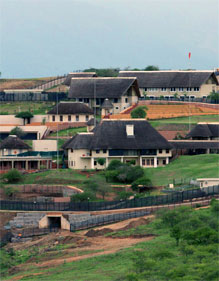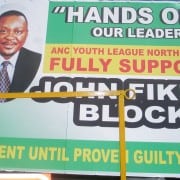|
Getting your Trinity Audio player ready...
|
 The presidential homestead in Nkandla, KwaZulu-Natal, is once more in the news, not only because of the ongoing squabble between public protector Thuli Madonsela and the the police, defence, state security and public works ministers, but also because of previously undisclosed documentation that has just come to light.
The presidential homestead in Nkandla, KwaZulu-Natal, is once more in the news, not only because of the ongoing squabble between public protector Thuli Madonsela and the the police, defence, state security and public works ministers, but also because of previously undisclosed documentation that has just come to light.
Parliament’s joint standing committee on intelligence (JSCI) released a report on 14 November in which it stated that there was indeed widespread corruption in the processes carried out around the homestead’s upgrades. The JSCI said that there was much flouting of procurement procedures, and that foreign nationals were employed – which is not allowed in terms of government safety regulations.
Certain companies involved did not have the required security clearances, revealed the document, titled Report on the Prestige Project A: Security Measures at the President’s private residence in Nkandla. This situation was only rectified after a year, during which time the firms had access to building plans and other potentially sensitive documents, while not being cleared for the job.
Spending spree with taxpayers' money
"As at November 19, 2012, the actual cost for the whole project (state and president's property) amounted to R206 420 644.28,” the report stated. It appears to absolve the Department of Public Works (DPW) from guilt in this spending spree.
However, the opposition Democratic Alliance has said that the report is merely an attempt to justify the spending of millions of rands of public money.
“If this report were serious about holding all those responsible accountable, it would have instead recommended that they be referred to the police for a criminal investigation and that the relevant portfolio committee be briefed,” said Lindiwe Mazibuko, the party’s parliamentary leader.
Thousands of pages available online
amaBhungane, the M&G Centre for Investigative Journalism, has released over 12 000 pages of evidence about the state-funded upgrade at President Jacob Zuma's home in the small town of Nkandla. These are not public protector documents, but rather those from the DPW, which is responsible for the construction work done at Nkandla.
The document collection may be downloaded here.
"The release of the entire cache of documents is motivated by the crucial need for transparency,” said Vinayak Bhardwaj, amaBhungane’s advocacy co-ordinator. Read more about the newspaper’s response here.
The centre also submitted a request for records related to Nkandla procurement, under the Promotion of Access to Information Act. The department refused on the grounds that security would be compromised.
However, amaBhungane persisted, and eventually, under oath, a civil engineer testified that hundreds of documents related to the project would have no security implications. The department conceded the point, and in June 2013 handed over 42 files containing more than 12 000 pages.
According to the centre, the files essentially contain nothing that needed to be kept secret, “except that they paint an unedifying picture of how senior officials and politicians:
- Scrambled to meet deadlines set by Zuma, taking short cuts on tendering processes;
- Shifted money from other programmes to accommodate the unbudgeted spending;
- Implemented the Nkandla project with few proper cost controls and no allocated budget or limit on spending;
- Were mainly concerned with delivering to Zuma at a speed and level of quality befitting a ‘prestige project’;
- Were reluctant to allocate costs to Zuma, including for the building of a new cattle kraal, a plant nursery, a road network and other improvements that will benefit Zuma’s family long after he ceases to be president.
- Paid out an underperforming contractor at least partly because threatened court action could cause ‘political fallout that could possibly influence the principal’s political position very negatively’.”
Seeking clarity from public works dept
Corruption Watch has also been advocating for the release of the information for months. Towards the end of last year the organisation wrote a letter to public works minister Thulas Nxesi, seeking clarity on his comments regarding the planned R203-million Nkandla upgrade – this came after Nxesi had defended the controversial expenditure, saying that it was in line with the Ministerial Handbook and formed part of security arrangements for South African presidents’ private residences.
The minister didn’t respond by the deadline requested – 12 October 2012 – and Corruption Watch wrote again on 15 October, urging the department to respond. The department did reply the next day, saying that the new capacity for the presidential homestead was been in the planning for some time, and that it complied with the Ministerial Handbook. Read Nxesi’s full response here.
However, Corruption Watch informed Nxesi that his reply was inadequate, as it failed to “address the concerns raised in the media about the Nkandla homestead upgrade, which are concerns echoed by members of the public that report to Corruption Watch”. Read Corruption Watch’s full third letter here.
To date, the Department of Public Works has ignored this letter.









